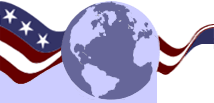
 |
|
|
|
|

OFFICE OF GLOBAL EDUCATIONAL PROGRAMSThe Office of Global Educational Programs (ECA/A/S) is responsible for planning, developing, administering and monitoring three major Fulbright exchange activities, i.e., the Teacher Exchange Program, the Humphrey Fellowship Program, and Institutional Linkages Programs. As the only U.S. Government office concerned with the welfare of foreign students in the United States, it also is responsible for a variety of programs, products and services designed to strengthen overseas educational information centers and campus and community programs serving international students and scholars. The office also administers special projects to support curriculum reform and civic education in Central Europe and NIS. The office is assisted by private, non-profit organizations in administering various aspects of the programs.
The Humphrey Fellowships and Institutional Linkages Branch (ECA/A/S/U) focuses on programs where academic experiences intersect with professional life to encourage international cooperation that transcends traditional barriers between education and the work of practitioners in a wide range of professions. The Hubert H. Humphrey Fellowship Program brings mid-career professionals to the U.S. for programs that combine graduate-level academic training with related practical professional experiences. Public affairs sections of U.S. embassies or binational Fulbright commissions nominate Fellows based on their potential for national leadership. By providing these future leaders with a shared experience of U.S. society and culture and exposing them to current U.S. approaches to the fields in which they work, the program provides a basis for establishing lasting ties between Fellows and their professional American counterparts. Fellowships are granted competitively to candidates with a commitment to public service in both the public and private sectors. Fellows are placed in groups by specialty on campuses around the United States. The Institutional Linkage Programs administered by the Branch enable U.S. colleges and universities to pursue specific institutional goals in cooperation with partner institutions overseas through the exchange of teachers, administrators, and graduate students for an appropriate combination of teaching, consultation, research and outreach. Projects typically last three years to facilitate a comprehensive strategy for achieving project objectives. Institutional Linkage Programs include the Educational Partnerships Program (formerly College and University Affiliations Program), in which anticipated eligibility of countries throughout the world is announced on a rotating, three-year basis. In addition, the NIS College and University Partnerships Program funds projects with institutions in the New Independent States of the former Soviet Union, and specialized projects are developed to provide comprehensive support to selected institutions in Eastern Europe and the NIS. The Community College Partnership Program supports linkages between U.S. community colleges and institutions in selected countries in the NIS. Educational Information and Resources Branch The Educational Information and Resources Branch (ECA/A/S/A) promotes the international exchange of students and scholars through a network of overseas educational information centers located in nearly every country of the world. More than four million prospective students contact these centers each year. The Branch estimates that a majority of the over 500,000 international students now studying in the U.S. contacted a Branch -affiliated center for information on U.S. study. These students contribute an estimated $11 billion annually to the U.S. economy. The Branch also works with partner organizations to support international students and scholars on U.S. campuses, fund professional development and training for foreign student advisers, admissions personnel, and others at U.S. institutions, and supports activities that help build mutual understanding through the exchange of people and ideas. Branch programs assist international activities of the U.S. academic community, including student and faculty exchanges, study abroad, coordination with foreign governments, evaluation of foreign institution's credentials, and recruitment of foreign students. The Branch funds research on international education, including Open Doors, the annual census of the international academic community in the United States which tracks statistics about international students and scholars in the U.S. and U.S. students who study abroad.
The Fulbright Teacher Exchange Branch (ECA/A/S/X), in cooperation with the public affairs section of U.S. embassies, binational Fulbright commissions, and counterpart agencies in 34 participating countries, arranges direct two-way academic year and short-term exchanges of U.S. and foreign teachers and education administrators. There are also a limited number of semester and shorter-term assignments, initiatives, and opportunities for U.S. teachers to attend seminars abroad. Each year approximately 700 U.S. and foreign educators -- 450 in the Fulbright, 250 in other programs -- are exchanged. Exchanges are open to college faculty members, teacher trainers, secondary level teachers, and school administrators. For Canada, the United Kingdom, Finland, and Colombia, elementary teachers are also eligible. Educators are selected for the programs from among a wide range of subject fields, including history, foreign languages, special education, business, the sciences, and literature. Many teachers from non-English speaking countries teach their native languages in U.S. classrooms while their U.S. counterparts abroad teach English as a foreign language.
Office of Global Educational
Programs
For further information, contact: |
||||||